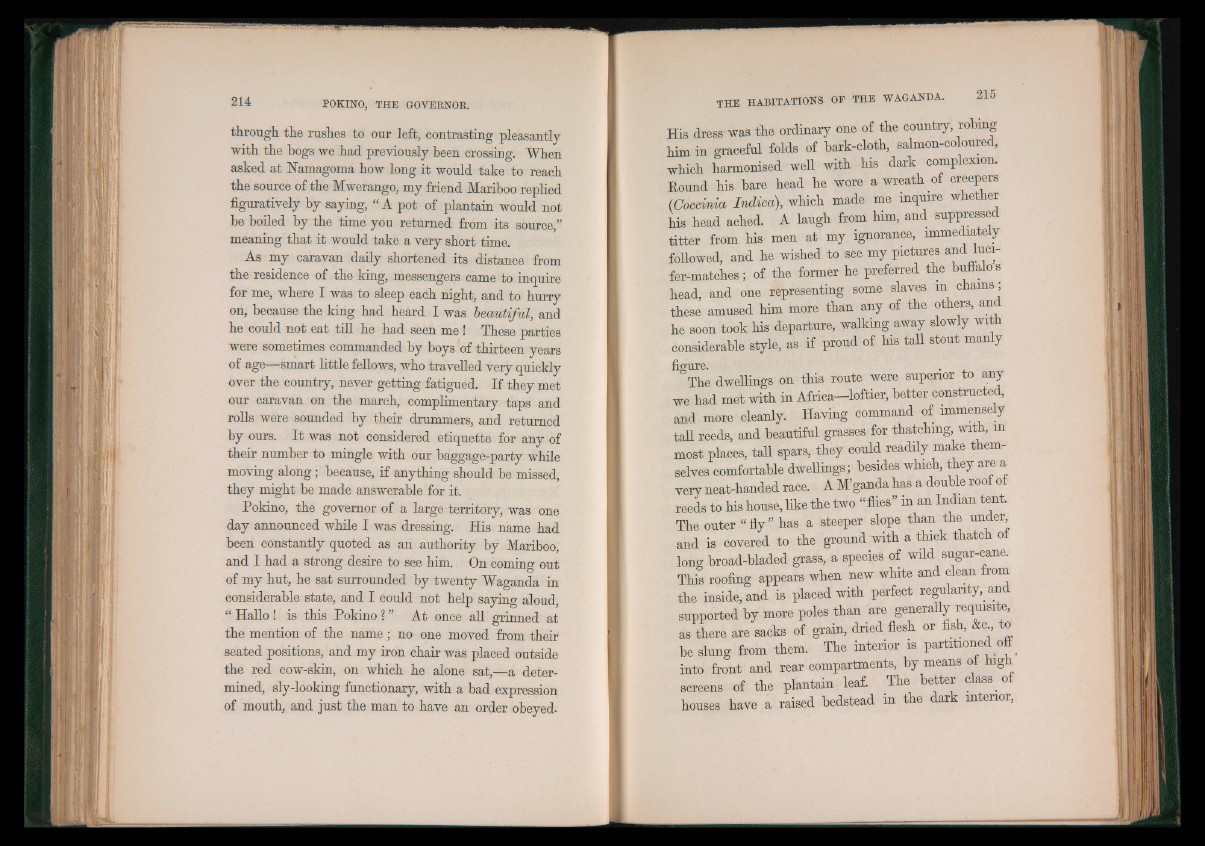
through the rushes to our left, contrasting pleasantly
with the bogs we had previously been crossing. When
asked at Namagoma how long it would take to reach
the source of the Mwerango, my friend Mariboo replied
figuratively by saying, “ A pot of plantain would not
be boiled by the time you returned from its source,”
meaning that it would take a very short time.
As my caravan daily shortened its distance from
the residence of the king, messengers came to inquire
for me, where I was to sleep each night, and to hurry
on, because the king had heard I was beautiful, and
he could not eat till he had seen me ! These parties
were sometimes commanded by boys of thirteen years
of age—smart little fellows, who travelled very quickly
over the country, never getting fatigued. If they met
our caravan on the march, complimentary taps and
rolls were sounded by their drummers, and returned
by ours. It was not considered etiquette for any of
their number to mingle with our baggage-party while
moving along; because, if anything should be missed,
they might be made answerable for it.
Pokino, the governor of a large territory, was one
day announced while I was dressing. His name had
been constantly quoted as an authority by Mariboo,
and I had a strong desire to see him. On coming out
of my hut, he sat surrounded by twenty Waganda in
considerable state, and I could not help saying aloud,
“ Hallo! is this Pokino?” At once all grinned at
the mention of the name; no one moved from their
seated positions, and my iron chair was placed outside
the red cow-skin, on which he alone sat,—a determined,
sly-looking functionary, with a bad expression
of mouth, and just the man to have an order obeyed.
His dress was the ordinary one of the country, robing
him in graceful folds of bark-cloth, salmon-coloured,
which harmonised well with his dark complexion.
Pound his bare head he wore a wreath of creepers
(Coccinia Indica), which made me inquire whether
his head ached. A laugh from him, and suppressed
titter from his men at my ignorance, immediately
followed, and he wished to see my pictures and lucifer
matches ; of the former he preferred the buffalos
head, and one representing some slaves m chains,
these amused him more than any of the others, and
he soon took his departure, walking away slowly with
considerable style, as if proud of his tall stout manly
figure. . ,
The dwellings on this route were superior to any
we had met with in Africa-—loftier, better constructed,
and more cleanly. Having command of immensely
tall reeds, and beautiful grasses for thatching with, in
most places, tall spars, they could readily make themselves
comfortable dwellings; besides which, they are a
very neat-handed race. A M’ganda has a double roof of
reeds to his house, like the two “flies” in an Indian tent.
The outer “ fly” has a steeper slope than the under,
and is covered to the ground with a thick thatch of
long broad-bladed grass, a species of wild sugar-cane.
This roofing appears when new white and clean from
the inside, and is placed with perfect regularity, and
supported by more poles than are generally requisite,
as there are sacks of grain, dried flesh or fish, &c to
be slung from them. The interior is partitioned off
into front and rear compartments, by means of hig
screens of the plantain leaf. The better class o
houses have a raised bedstead in the dark interior,